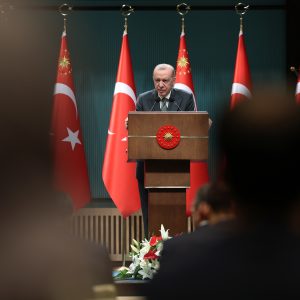China warns of ‘forceful measures’ if US House speaker visits Taiwan
ISTANBUL – Amid unconfirmed reports that the speaker of the US House of Representatives is planning to visit self-ruled Taiwan, China has warned of “forceful measures” if any such trip happens.
“If (US House) Speaker Nancy Pelosi visits Taiwan island, it would bring serious damage to the foundation of China-US relations, and will send wrong messages to the secessionists,” said Zhao Lijian, spokesman of China’s Foreign Ministry.
He said China would retaliate “with resolute and forceful measures.”
Beijing’s warning came amid media reports that Pelosi will visit Taiwan after her trip to Japan on the weekend.
China sees Taiwan as its “breakaway province” while Taipei has been insisting on its independence since 1949.
“All ensuing consequences will be borne solely by the US,” Chinese daily Global Times quoted Zhao as saying.
He said Beijing “has already lodged solemn representations to the US” side over the reports of Pelosi’s trip.
“The US Congress is a part of the US government, so it should strictly follow the One China principle upheld by the US,” he added.
If Pelosi goes ahead with the plan, it would be the first visit to Taiwan by a sitting US Congress speaker in 25 years, following Republican Newt Gingrich’s 1997 trip to meet with then-President Lee Teng-hui.
China’s Defense Ministry said the country “will take powerful measures to resolutely defeat all external interference,” a day after Washington approved another arms sale of $95 million to Taiwan.
The Chinese military will “resolutely defeat ‘Taiwan independence’ secessionist attempts and firmly safeguard national sovereignty and territorial integrity,” Tan Kefei, a spokesperson for the ministry said.
The US formally recognized China in 1979 and shifted diplomatic relations from Taipei to Beijing, including Taiwan as part of mainland China.
The Taiwan Relations Act, a 1979 law, has guided US relations with Taiwan. Ties have also been informed by what is known as the Three Communiques, which are bilateral agreements with China.











